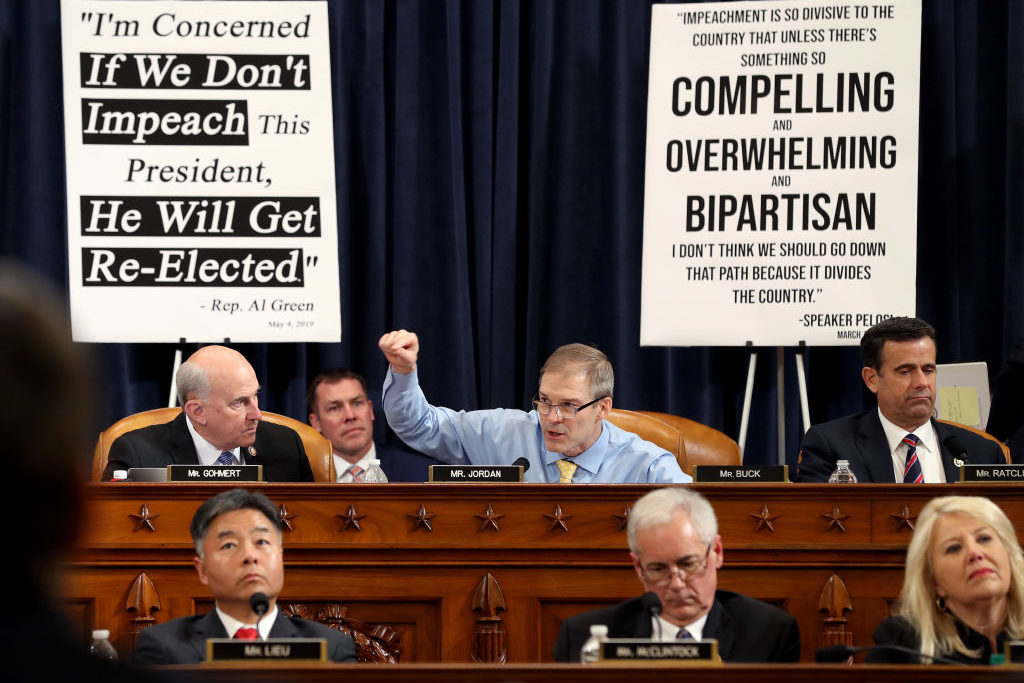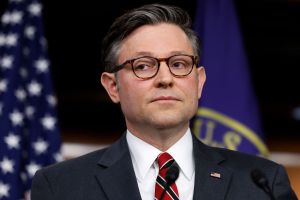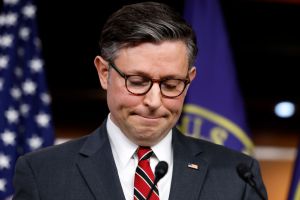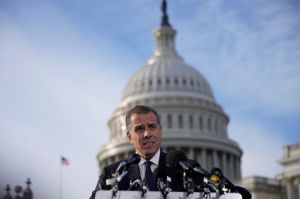So, impeachment it is. Speaker Nancy Pelosi has announced that the House will begin articles of impeachment against President Donald Trump, and the vote will probably take place before the year is out. The inevitable is, it turns out, inevitable. Henry Kissinger knows something about impeachment. Not because his boss, Richard Nixon, was almost impeached, but rather because Kissinger is a realist. And the reality of impeachment is that it doesn’t work — the threshold for launching impeachment proceedings is low enough that it can be done frivolously, for merely partisan purposes. But the threshold for removing a president from office is so high that it has never been met, and it almost certainly won’t be met in the case of Donald Trump.Kissinger only sketched these points in his remarks last night at the Four Seasons Hotel in Washington, D.C., where he was interviewed on stage by Mike Mullen, former chairman of the Joint Chiefs of Staff, at a dinner celebrating the 25th anniversary of the Center for the National Interest — the organization once known as the Nixon Center. Impeachment was Mullen’s last question for Kissinger, and the 96-year-old former national security adviser and secretary of state didn’t hold back. He acknowledged Nixon’s wrongdoing but said impeachment would not have been warranted in his case, either. From Kissinger’s perspective, impeachment should only be the remedy when a president is systematically trying to overturn the Constitution — it’s a failsafe. It should not be employed in doubtful cases or for minor crimes even when there is no doubt.There was more sense in Kissinger’s five minutes of comments on the subject than there was in a full day’s worth of testimony in Congress yesterday about the legal grounds for impeaching President Trump. Legal and constitutional justifications are simply beside the point. Impeachment is not a judicial proceeding: it’s every bit as much a political vote as any vote by Congress on gun control or entitlement reform or abortion. Only twice has Congress impeached a president, and each time the process was nakedly partial. Supporters of Andrew Johnson’s impeachment were political enemies of Andrew Johnson; supporters of Bill Clinton’s impeachment were political enemies of Bill Clinton. And so it is with Donald Trump and his enemies in the Democratic party.  Democrats can impeach Trump on any grounds they wish, and they will. The liberal activists in the party’s base fully expected that they would get to see Trump impeached for collusion with Russia once the Mueller report was released. When Mueller failed to call for impeachment, the activists were dismayed. They demanded that Nancy Pelosi do something. So when a politically plausible opportunity arose in the form of the Ukraine saga, she did. Democrats proceeded to do what they had wanted to do all along, from the day Donald Trump was inaugurated: they started impeachment procedures.Republicans in the Senate are not constrained in how they evaluate evidence, or anything else they care to weigh, once President Trump goes to trial. They can follow Kissinger’s advice — or the advice of any number of legal scholars and historians from the Clinton impeachment — and just decide that the matters involved in Trump’s case are not grave enough to warrant his removal from office. That’s if any of them wish to allow that Trump did anything wrong at all, which is unlikely. Democrats know this, and they’re counting on it: let vulnerable Republicans in the Senate cast their votes to acquit Trump. That will hurt them in their re-election races and might give Democrats the margin they need to control the Senate after 2020. Electoral considerations were very much on the mind of Richard Nixon when he resigned in 1974 rather than face impeachment. Republicans were facing a bloodbath in that year’s midterm elections either way, and a bloodbath is just what they got even with Nixon out of office. But had Nixon remained, the rout could have been even worse. And more importantly, had an impeachment dragged into 1975 — when Democrats’ ranks in the Senate would have been augmented by new members — not only would Nixon’s conviction and removal been virtually a foregone conclusion, it would have harmed the Republicans’ chances in the 1976 presidential election as well. As it happened, although Gerald Ford suffered for his pardon of Nixon, he was highly competitive nonetheless in ’76. Today, every GOP senator who aspires to run for president one day wants to court President Trump’s base, no matter how those senators feel about Trump himself. The fury of Democrats and the rather small number of voters who are true independents counts for nothing in a Republican primary. This is why it’s no mystery that even GOP senators (and not just senators) who are clearly not fond of Trump are not about to join the Democrats’ efforts to impeach and remove him. And a removed Trump might well choose to campaign against Republican senators who voted against him, heading to their states and supporting their primary challengers. Even in a scenario where enough of the public at large turns against Trump to get GOP senators to vote against him, the remnants of Trump’s support in the party’s primary races might be formidable. Ideological activists in both parties will be emboldened by the Trump impeachment. Why, Republican grassroots activists will demand to know, didn’t the GOP impeach Barack Obama when it had the chance? Left-wing activists, for their part, will know that they can push Democrats to impeach any Republican, if they apply as much pressure to future party leaders as they applied to Pelosi this time. Kissinger worries about the polarization that further impeachments would exacerbate. But the effects could be unpredictable: for one thing, Congress as an institution often has approval ratings in low double-digits or worse. Even a president as ‘polarizing’ as Trump has a solid 40 percent of the voting public on his side. So what happens when an institution with 20 percent approval (Congress) tries a few times to assert itself over an institution (the presidency) whose occupant is more than twice as popular? The result may well be to show Congress for the broken institution that it is and empower the presidency even more. Then again, the unelected deep state might be the big winner if Congress and the presidency delegitimize each other. Short of a true national emergency, not just a partisan freakout of the kind that has been going on since Trump’s election, impeachment is an implausible restraint on executive power. It’s only political theater. Yet curiously a much more basic power that Congress can use to rebuke the executive, namely the power of the purse, is hardly considered. If Democrats really think Donald Trump is dangerous, why don’t they defund his administration? Or if Republicans want to stop the next president, how about depriving him or her of revenue that is the lifeblood of progressive government? The power of the purse was the original weapon in the hands of legislators when they faced unjust kings — or at any rate kings whose justice they disliked. But to reassert such a power today would require that legislators take on greater responsibility for government, sidelining the executive administrators and regulators who are practically the essence of the modern state. Now that would be serious — too serious to contemplate.
Democrats can impeach Trump on any grounds they wish, and they will. The liberal activists in the party’s base fully expected that they would get to see Trump impeached for collusion with Russia once the Mueller report was released. When Mueller failed to call for impeachment, the activists were dismayed. They demanded that Nancy Pelosi do something. So when a politically plausible opportunity arose in the form of the Ukraine saga, she did. Democrats proceeded to do what they had wanted to do all along, from the day Donald Trump was inaugurated: they started impeachment procedures.Republicans in the Senate are not constrained in how they evaluate evidence, or anything else they care to weigh, once President Trump goes to trial. They can follow Kissinger’s advice — or the advice of any number of legal scholars and historians from the Clinton impeachment — and just decide that the matters involved in Trump’s case are not grave enough to warrant his removal from office. That’s if any of them wish to allow that Trump did anything wrong at all, which is unlikely. Democrats know this, and they’re counting on it: let vulnerable Republicans in the Senate cast their votes to acquit Trump. That will hurt them in their re-election races and might give Democrats the margin they need to control the Senate after 2020. Electoral considerations were very much on the mind of Richard Nixon when he resigned in 1974 rather than face impeachment. Republicans were facing a bloodbath in that year’s midterm elections either way, and a bloodbath is just what they got even with Nixon out of office. But had Nixon remained, the rout could have been even worse. And more importantly, had an impeachment dragged into 1975 — when Democrats’ ranks in the Senate would have been augmented by new members — not only would Nixon’s conviction and removal been virtually a foregone conclusion, it would have harmed the Republicans’ chances in the 1976 presidential election as well. As it happened, although Gerald Ford suffered for his pardon of Nixon, he was highly competitive nonetheless in ’76. Today, every GOP senator who aspires to run for president one day wants to court President Trump’s base, no matter how those senators feel about Trump himself. The fury of Democrats and the rather small number of voters who are true independents counts for nothing in a Republican primary. This is why it’s no mystery that even GOP senators (and not just senators) who are clearly not fond of Trump are not about to join the Democrats’ efforts to impeach and remove him. And a removed Trump might well choose to campaign against Republican senators who voted against him, heading to their states and supporting their primary challengers. Even in a scenario where enough of the public at large turns against Trump to get GOP senators to vote against him, the remnants of Trump’s support in the party’s primary races might be formidable. Ideological activists in both parties will be emboldened by the Trump impeachment. Why, Republican grassroots activists will demand to know, didn’t the GOP impeach Barack Obama when it had the chance? Left-wing activists, for their part, will know that they can push Democrats to impeach any Republican, if they apply as much pressure to future party leaders as they applied to Pelosi this time. Kissinger worries about the polarization that further impeachments would exacerbate. But the effects could be unpredictable: for one thing, Congress as an institution often has approval ratings in low double-digits or worse. Even a president as ‘polarizing’ as Trump has a solid 40 percent of the voting public on his side. So what happens when an institution with 20 percent approval (Congress) tries a few times to assert itself over an institution (the presidency) whose occupant is more than twice as popular? The result may well be to show Congress for the broken institution that it is and empower the presidency even more. Then again, the unelected deep state might be the big winner if Congress and the presidency delegitimize each other. Short of a true national emergency, not just a partisan freakout of the kind that has been going on since Trump’s election, impeachment is an implausible restraint on executive power. It’s only political theater. Yet curiously a much more basic power that Congress can use to rebuke the executive, namely the power of the purse, is hardly considered. If Democrats really think Donald Trump is dangerous, why don’t they defund his administration? Or if Republicans want to stop the next president, how about depriving him or her of revenue that is the lifeblood of progressive government? The power of the purse was the original weapon in the hands of legislators when they faced unjust kings — or at any rate kings whose justice they disliked. But to reassert such a power today would require that legislators take on greater responsibility for government, sidelining the executive administrators and regulators who are practically the essence of the modern state. Now that would be serious — too serious to contemplate.
Impeachment doesn’t work
The Democrats could tackle Trump in more effective ways. But they are too interested in the political theater

Reps. Louie Gohmert, Ted Lieu, Jim Jordan, Tom McClintock, John Ratcliffe and Debbie Lesko during the House Judiciary Committee’s impeachment inquiry
So, impeachment it is. Speaker Nancy Pelosi has announced that the House will begin articles of impeachment against President Donald Trump, and the vote will probably take place before the year is out. The inevitable is, it turns out, inevitable. Henry Kissinger knows something about impeachment. Not because his boss, Richard Nixon, was almost impeached, but rather because Kissinger is a realist. And the reality of impeachment is that it doesn’t work — the threshold for launching impeachment proceedings is low enough that it can be done frivolously, for merely partisan purposes. But the threshold for…

















